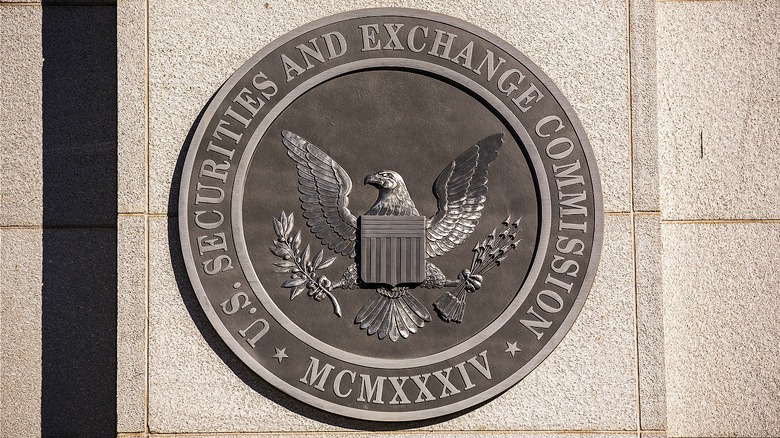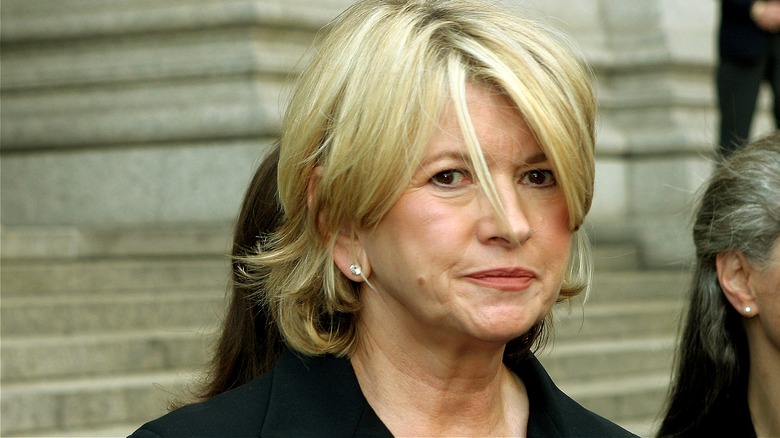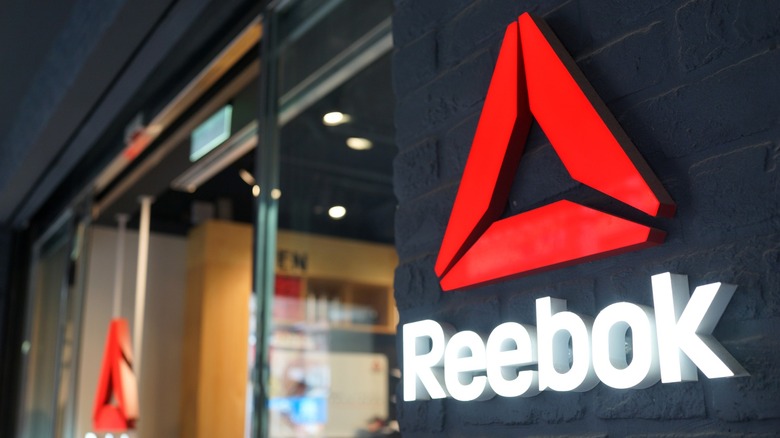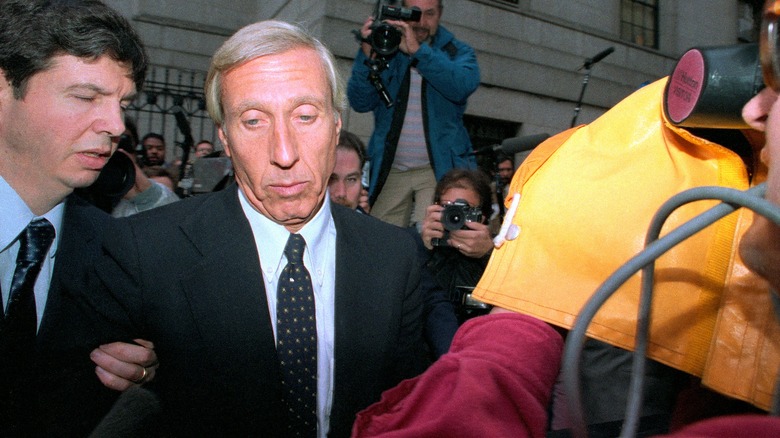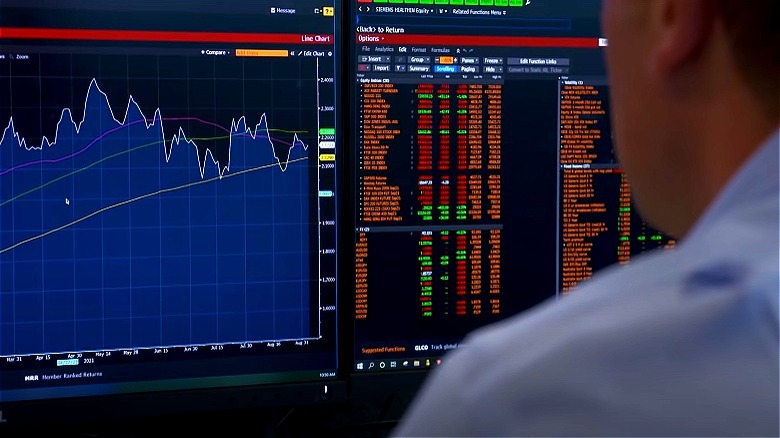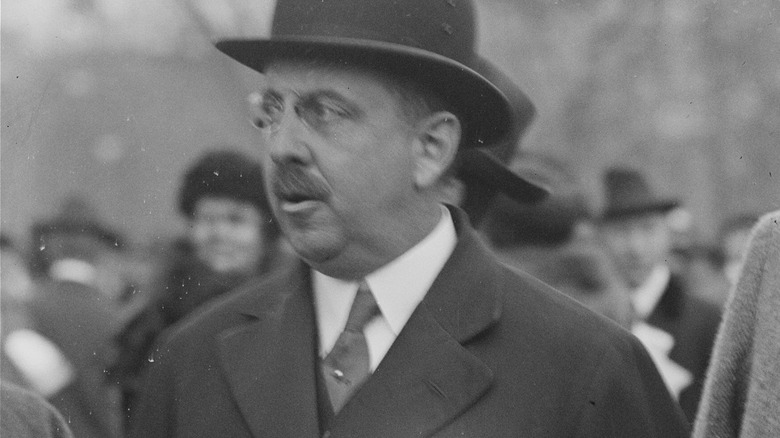Outrageous Insider Trading Busts We Still Can't Get Over
Who doesn't want the inside scoop? Whether it's juicy gossip about our neighbors, the magic words to say to our boss come bonus time, or the secret ingredient in our favorite restaurant's special sauce, everybody wants in on the inside line. But while it's human nature to snare (and spill) secrets, the act holds its fair share of consequences. Unless you're a Wall Street luminary accused of insider trading. Then, things just get notoriously difficult to prosecute.
Insider trading consists of a public company's "insiders" (or those close to them) using non-public material information to trade stock at a profit, betraying the fiduciary responsibility they have to company shareholders. In other words, inside traders use company secrets for their own personal gain. "Material information" can include any info not known to the general public that could change a company's stock prices, including merger information, a pending investigation or litigation, or FDA denial or approval.
Insider trading is mostly illegal in most countries, and the Securities and Exchange Commission (SEC) has been attempting to regulate such market manipulation in some fashion since 1934. Yet the threat of federal investigation hasn't stopped some from playing the stock market by breaking the rules, or outright rigging the game. Throughout time (and especially starting in the "greed is good" 1980s), massive conspiracies, corrupt ethics, double-crosses, and absolute audacity are common bonds shared in this very incomplete list of outrageous insider trading busts we still can't get over.
Martha Stewart
Martha Stewart is a multimedia magnate, a homemaking celebrity, and famous for her bout with insider trading. In 2001, Stewart held shares of biopharmaceutical company ImClone, which at the time was awaiting FDA approval for the cancer drug Erbitux. The drug promised to be revolutionary in cancer treatment, but ImClone's then-CEO Samuel D. Waksal privately learned that the FDA wouldn't be approving Erbitux, just days before that announcement went public.
Waksal alerted friends and family to sell all ImClone shares. He told Merrill Lynch broker Doug Faneuil, assistant of Stewart's then-broker Peter E. Bacanovic, that he wanted to sell. Faneuil called Bacanovic, on vacation, for assistance. Bacanovic had Faneuil inform Stewart of Waksal's plan to sell. Stewart then sold her shares for a total of $229,513. The SEC filed charges against Stewart in 2003. The subsequent press and trial became a circus and inspired the iconic phrase "I just want to focus on my salad," and a movie starring Cybill Shepherd.
While Stewart has maintained her innocence since the beginning, and her securities fraud charges were thrown out, she was convicted on four counts of obstructing justice and lying to investigators about the sale. Stewart served a handful of months in prison, and following a short spate of canceled appearances and pulled programs, she largely regained her superstar status. In 2022, Stewart even became a spokesperson for 19 Crimes, the cheeky wine brand that often puts convicts on its labels.
Eugene Plotkin and David Pajčin
Sometimes stolen material information is on actual printed material. Such is the case in this early- 2000s scandal, which encompasses two brokers getting a Merrill Lynch banker to provide insider tips on upcoming mergers, while recruiting two regular joes to work in Business Week's printing plant to steal tips hot off the press, literally. These insider traders used the stolen "Inside Wall Street" column to their advantage before the magazine hit newsstands, and the rest of the general public.
This sounds like a scam con artist Slippin' Jimmy would've cooked up on "Better Call Saul", but is instead the work of Goldman Sachs employees Eugene Plotkin and David Pajčin, the latter who also deployed his exotic dancer girlfriend to gather intel from her finance-world clients. According to the SEC, the Merrill Lynch scheme netted Plotkin, Pajčin, and their ring $6.4 million in ill-gotten gains, while the Business Week project netted only $345,000, proving crime might pay — but not always well.
Pajčin was arrested in 2005 for his crimes, caught after the SEC learned his aunt had turned a $2 million dollar profit trading Reebok stock, two days before a merger was announced, as reported by The New York Times. Pajčin ratted out Plotkin and his co-conspirators, pleaded guilty, and fled the United States on probation in 2008. The SEC ordered him to pay $27.8 million in fees; however, Pajčin remains at large, possibly making more schemes come true.
Ivan Boesky
Aggressive energy, relentless networking, and economic acumen was present and accounted for in Ivan Boesky at the height of his success — but so was insider trading. Boesky partially inspired the character of Gordon Gekko, and that "Wall Street" mentality of money worship and greed must be considered when reading his story. Throughout the '70s and '80s, Boesky made his name brokering arbitrage trades, with a business he founded with his wife, Seema Silberstein, a real-estate tycoon.
Boesky ramped his own fortune into the $200 million realm with trades related to mergers and acquisitions. By all accounts, Boesky was an excessive, angry man, and one driven by the desire for some sort of edge on his competition. Boesky also always seemed to know which company was about to be taken over by another, and exactly when to buy and sell stock. And in 1986, he was arrested for his edge, because it was — surprise — due to insider trading.
The SEC discovered the scope of Ivan Boesky's crimes, including working with investors to time trades, paying informants, and exchanging tips with other brokers. The government offered Boesky a reduced fine if he acted as an informant on his accomplices, including Michael Milliken, the "junk bond king." The reduced fine? A steal at $100 million.
In addition, Boesky was banned from ever working in securities again, served three years in prison, and likely lives off of the $20M divorce settlement from his former wife. Greed is clearly not always good — but depending on your appetite for scandal and disgrace, maybe it's good enough.
Christopher Hill and Lukas Kamay
Christopher Hill and Lukas Kamay are the subject of the corporate crime podcast "The Sure Thing," as well as Australia's biggest insider trading case to date. In the mid-aughts, Hill and Kamay were former university friends, both in their early 20s, and starting to make a name for themselves in their respective fields. Kamay was a foreign exchange trader at the National Australia Bank, while Hill was an analyst for the Australian Bureau of Statistics. The pair hatched a plan to use Hill's intel to positively affect Kamay's trades on the less-supervised foreign exchange market. Their initial plan was to keep the project low-key, but Kamay got greedy and supersized the plan.
Per The Australian Financial Review, Kamay and Hill agreed to open one secret account to house their gains of under $200,000. Instead, before their plan kicked off, Kamay opened a second (and third) secret account for his own "earnings." He played his insider trades by Hill's rules, filling the first account with only $200,000 — and his own accounts with millions.
Downfall came after Kamay and Hill's stockbroker discovered their connection, and a four-month police sting culminated in an arrest and lengthy sentencing after Kamay was filmed using Hill's intel to make a million-dollar trade in the bathroom. Investigators revealed Kamay even named a folder of his transactions "Wolf of Wall Street," after the 2013 film about Jordan Belfort's rapid rise (and fall) in the world of junk bonds.
Albert H. Wiggin
Insider trading isn't always illegal, but sometimes even legal activities can stink of corruption. And nothing smells worse than a millionaire who makes their fortune off of their own company's demise, especially during the Great Depression. Albert H. Wiggin holds such a distinction. Wiggin presided over Chase National Bank in New York from 1904 through the early 1930s — and he made a fortune by secretly shorting over 40,000 Chase shares in 1929. Not only were Wiggin's actions totally legal at the time, he also received a $100,000 pension from Chase after doing so. (Learn about the richest people during the Great Depression.)
Even though Wiggin made a public show of trying to save the market by joining with other Wall Street bankers on Black Thursday to create investment pools on the floor of the exchange, in private, Wiggin was working overtime, even using tax-free shell companies to hide his dirty dealings.
Light was shed on Wiggin's legal but despicable acts years later during the Pecora investigation in 1932. The result of the Pecora Commission and Albert H. Wiggin's actions led to the creation of the Wiggin Provision (requiring Wiggin to resign from Chase Bank), the Securities Exchange Act of 1934, and ultimately the SEC as we know it today.
